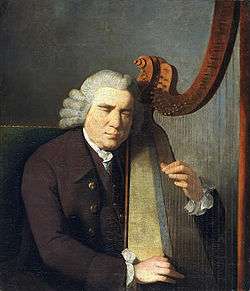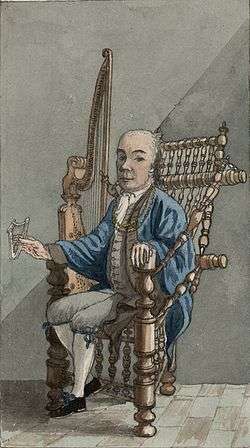John Parry (harpist)
John Parry (c.1710 – October 1782), known as Parri Ddall, Rhiwabon (or, in English, Blind Parry of Ruabon) was born in the Llŷn Peninsula, Caernarfonshire, now Gwynedd, in Wales, and was blind from birth.


His first patrons were the Griffiths family, of the Cefn Amwlch estate at Bryn Cynan on Pen Llŷn, who provided the young Parry with a Welsh triple harp. He later became harpist to Sir Watkin Williams-Wynn at Wynnstay, Ruabon and became a master of the High Baroque. He lived on the Wynnstay estate but spent much of his time at the Williams-Wynn's London home where he performed on the Welsh triple harp for London's cultural elite. Parry became a member of the Royal Society of Musicians in 1763.
He inspired Thomas Gray to write his 1757 poem, The Bard.[1] It is also claimed that Parri first wrote down – or dictated to his fellow-compiler Evan Williams – in his manuscript Antient British Music (1741) a then unnamed 'aria' which is now world-famous as "Deck the Halls with Boughs of Holly". It was subsequently published and named "Nos Galan" (in English, "New Year's Eve") in Musical and Poetical Relicks of the Welsh Bards (1784) by Edward Jones.
Parry remained with the Williams-Wynn family until his death in 1782. He was buried at Ruabon Parish Church on 10 October 1782.
John Parry's son, William Parry (1742–1791), was an accomplished artist. Many of his works, including portraits of his father, are held by the National Museum in Cardiff.
Bibliography
- John Parry (c.1710–1782): Y Telynor Dall – The Blind Harper – by Huw Williams: Clwyd County Council (1982)
- Frank Kidson’s contribution Welsh Music p.p. 492–501 of Grove's Dictionary of Music and Musicians Vol. V, T-Z, 1st edition 1910, ed. J.A. Fuller Maitland, London: Macmillan & Co. Ltd.
References
- Morgan, Prys (2012). "From Death to a View: The Hunt for the Welsh Past in the Romantic Period". In Hobsbawm, Eric; Ranger, Terence (eds.). The Invention of Tradition. Cambridge University Press. p. 75. ISBN 9781107604674.